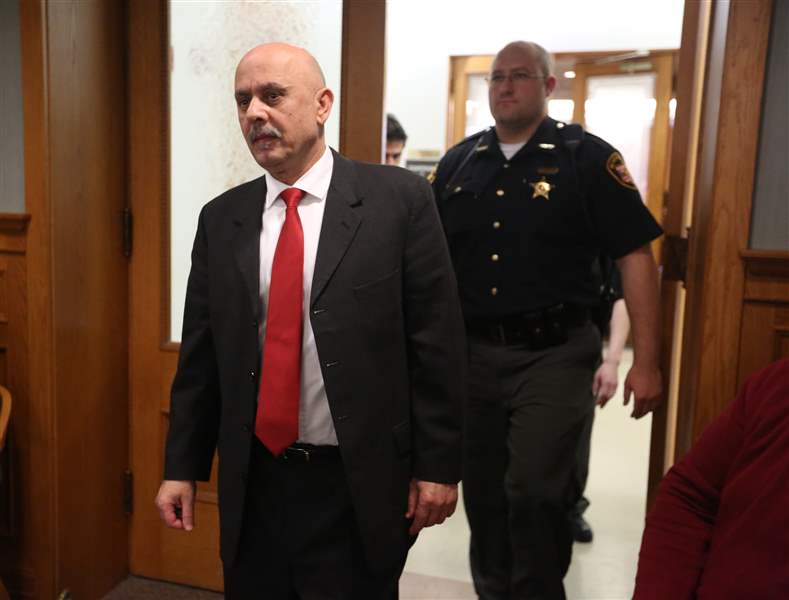
COURTS
Witness’ remark halts arson trial of Ray Abou-Arab
Judge dismisses jury for day after polygraph test mentioned
5/11/2017
Ray Abou-Arab enters Lucas County Common Pleas Court following a lengthy recess Wednesday.
THE BLADE/DAVE ZAPOTOSKY
Buy This Image
The eighth day of testimony in the trial of an Oregon man charged with setting a 2014 fire that killed two Toledo firefighters recessed abruptly Wednesday afternoon after a witness told the jury Ray Abou-Arab had “failed a polygraph” exam.
Toledo police Detective Sgt. Keefe Snyder was answering questions about a conversation he had with Mr. Abou-Arab two days after the fire, but before his arrest, when defense attorney Pete Rost asked him how he knew Mr. Abou-Arab had lied to police.
Sergeant Snyder said he hadn’t listened to Mr. Abou-Arab’s interviews with detectives, but he knew the defendant had been dishonest “because I did have knowledge that he obviously failed a polygraph.”
“Ohhhh,” Mr. Rost said in exasperation.
Lucas County Common Pleas Judge Stacy Cook immediately dismissed the jury but did not comment on the testimony.
Information about polygraphs — commonly called lie detectors — generally is not admissible in court.
Polygraphs are considered unreliable, but when jurors hear a defendant failed one, they could take that as an admission of guilt, a veteran defense attorney said.
“If the jury hears that a defendant failed a polygraph, it produces an unreasonable, but very concrete, inference of guilt,” said Toledo attorney Dave Klucas, who is not involved in the Abou-Arab case.
Jerome Phillips, another longtime defense attorney also not associated with the case, said it’s “hard to unring the bell” when something so prejudicial has been said in the jury’s presence.
While the incident could lead the court to declare a mistrial, Judge Cook sent the jury, and Sergeant Snyder, home about 5:15 p.m.
Prosecutors and defense attorneys were seen going in and out of the judge’s chambers, and about 6:30 p.m., Judge Cook returned to the bench and formally recessed the trial for the day, saying the court was “still in research stage due to some extenuating legal concerns that need to be looked into.”
Mr. Abou-Arab, 64, of Oregon is charged with two counts each of aggravated murder and murder, eight counts of aggravated arson, and a single count of tampering with evidence stemming from a Jan. 26, 2014, fire at a Magnolia Street building he owned. The fire claimed the lives of Toledo Fire Pvts. Stephen Machcinski, 42, and James Dickman, 31.
Attorneys were asked to return at 8 a.m. today; the jury is to return at 9:30 a.m.
Both defense attorney Sam Kaplan and Jeff Lingo, chief of the special units division for the Lucas County Prosecutor’s Office, declined to comment “at this time.”
Earlier in the day, Dr. Cynthia Beisser, a deputy Lucas County coroner, described in painstaking detail the injuries sustained by the two firefighters. Both men died from thermal burns over much of their bodies and from exposure to carbon monoxide, she said.
Dr. Beisser told the jury the firefighters did not die instantaneously but within “minutes.” She ruled both deaths as homicides based on information from investigators that classified the fire as an arson.
The firefighters’ families remained in the hallway during Dr. Beisser’s testimony, which included graphic photos from the autopsies performed a day after the fire.
Also Tuesday morning, an auditor who reviewed Mr. Abou-Arab’s financial condition at the time of the fire testified that the defendant was spending more than he was making during nine of the 12 months leading up to the fire.
David McCabe, a senior forensic auditor with the Bureau of Alcohol, Tobacco, Firearms and Explosives, said his analysis showed that Mr. Abou-Arab was spending an average of $1,000 a month more than his monthly income of $5,700, which included his pension and revenue from the rental property and a small business.
“Based on my analysis, Ray Abou-Arab was having financial problems leading up to and at the time of the fire,” Mr. McCabe said.
Under cross-examination by Mr. Rost, Mr. McCabe confirmed that Mr. Abou-Arab was not the subject of any foreclosure or civil action and said he was paying his bills on time.
The defendant had declared bankruptcy in 2012, Mr. McCabe said. The Magnolia Street building was insured for $420,000, though damage from the fire was estimated at $107,000 by Nationwide Insurance, he said.
No claim was paid because the fire was determined to be intentionally set.
Prosecutors allege Mr. Abou-Arab used gasoline to start the fire to make an insurance claim.
Contact Jennifer Feehan at: jfeehan@theblade.com or 419-213-2134.